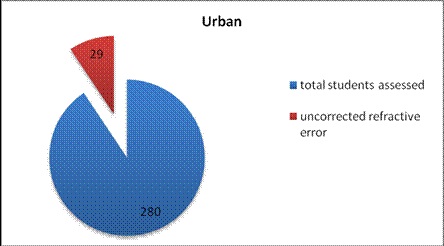Comparison between primary school children of urban and rural areas for prevalence of uncorrected refractive errors and amblyopia
Abstract
Aims: The present study was planned to evaluate the prevalence of uncorrected refractive errors and the frequency of amblyopia in primary school children, and to compare the findings between rural and urban settings.
Material and Method: It was a cross sectional study in which 560 children studying in 1st to 6th standard in age group of 6 to 10 years in primary school of urban and rural area were evaluated for uncorrected refractive errors and amblyopia. All children underwent a preliminalary examination at school level and those who were having refractive errors were further undergone a detail eye check up at ophthalmology OPD of our medical college. Later on the data was analysed statistically.
Results: The prevalence of uncorrected refractive errors was found to be 10.35% (29/280) in urban area and 8.57% (24/280) in rural area. Out of total uncorrected refractive errors, mostly have uncorrected myopia both in urban and rural areas.
Conclusion: Difference in prevalence of uncorrected refractive errors and amblyopia was found to be statistically insignificant in both the urban and rural primary school children. (p value=0.564 for uncorrected refractive errors and p value=1 for amblyopia)
Downloads
References
2. World Health Organization. Elimination of avoidable visual disability due to refractive error Report of an informal planning meeting WHO/PBL/00.79 pp: 6-10.
3. The Eye Diseases Prevalence Research Group. The Prevalence of Refractive Errors among Adults in the United States, Western Europe, and Australia. Arch Ophthalmol. 2004; 122:495- 505. Opton Vis Sci 1996; 73 [11]:695-700.
4. Tong L, Saw SM, Lin Y, Chia KS, Koh D, Tan D. Incidence and progression of astigmatism in Singaporean children. Invest Ophthalmol Vis Sci. 2004 Nov;45(11):3914-8. [PubMed]
5. Goh PP, Abqariyah Y, Pokharel GP, Ellwein LB. Refractive error and visual impairment in school-age children in Gombak District, Malaysia. Ophthalmology 2005 Apr;112(4):678-85. [PubMed]
6. Khurana A K , Khurana B .Optics and Refraction .In: Khurana A K , editor. Comprehensive ophthalmology, 5th ed. New Delhi:New age international (p)limited publishers.;2012.p.478-479.
7. Sihota R , Tandon R . Refractive errors of the eye . In: Sihota R , Tandon R, editors. Parson’s Diseases Of The Eye , 21st ed. New Delhi: Elsevier ; 2011.p.79. [PubMed]
8. Koklanis K, Abel LA, Aroni R. Psychosocial impact of amblyopia and its treatment: a multidisciplinary study. Clin Experiment Ophthalmol. 2006;34:743–750. [PubMed]
9. He M, Zeng J, Liu Y, Xu J, Pokharel GP, Ellwein LB. Refractive error and visual impairment in urban children in southern China. Invest Ophthalmol Vis Sci. 2004 mar;45(3):793–799. [PubMed]
10. Goh PP, Abquariyah Y, Pokharel GP, Ellwein LB. Refractive error and visual impairment in school-age children in Gombak District, Malaysia. Ophthalmology. 2005 Apr;112(4):678–685. [PubMed]
11. Zhao J, Mao J, Luo R, Li F, Munoz SR, Ellwein LB. The progression of refractive error in school-age children: Shunyi district, China. Am J Ophthalmol. 2002 Nov;134(5):735–743. [PubMed]
12. Wedner SH, Ross DA, Todd J, Anemona A, Balira R, Foster A. Myopia in secondary school students in Mwanza City, Tanzania: the need for a national screening programme. Br J Ophthalmol. 2002;86(11):1200–1206. [PubMed]
13. Sethi S, Kartha GP. Prevalence of refractive errors among school children of Ahmedabad city. Ind Journ Com Med 2000;25:181-3.
14. Matta S, Matta P, Gupta V, Dev A. Refractive errors among adolescents attending Ophthalmic OPD; Ind Joun Comm Medicine. 2006-04 - 2005-06; 31(2). [PubMed]
15. Lin LL, Shih YF, Hsiao CK, Chen CJ, Lee LA, Hung PT. Epidemiologic study of the prevalence and severity of myopia among schoolchildren in Taiwan in 2000. J Formos Med Assoc 2001 Oct;100(10):684-91.



 OAI - Open Archives Initiative
OAI - Open Archives Initiative


